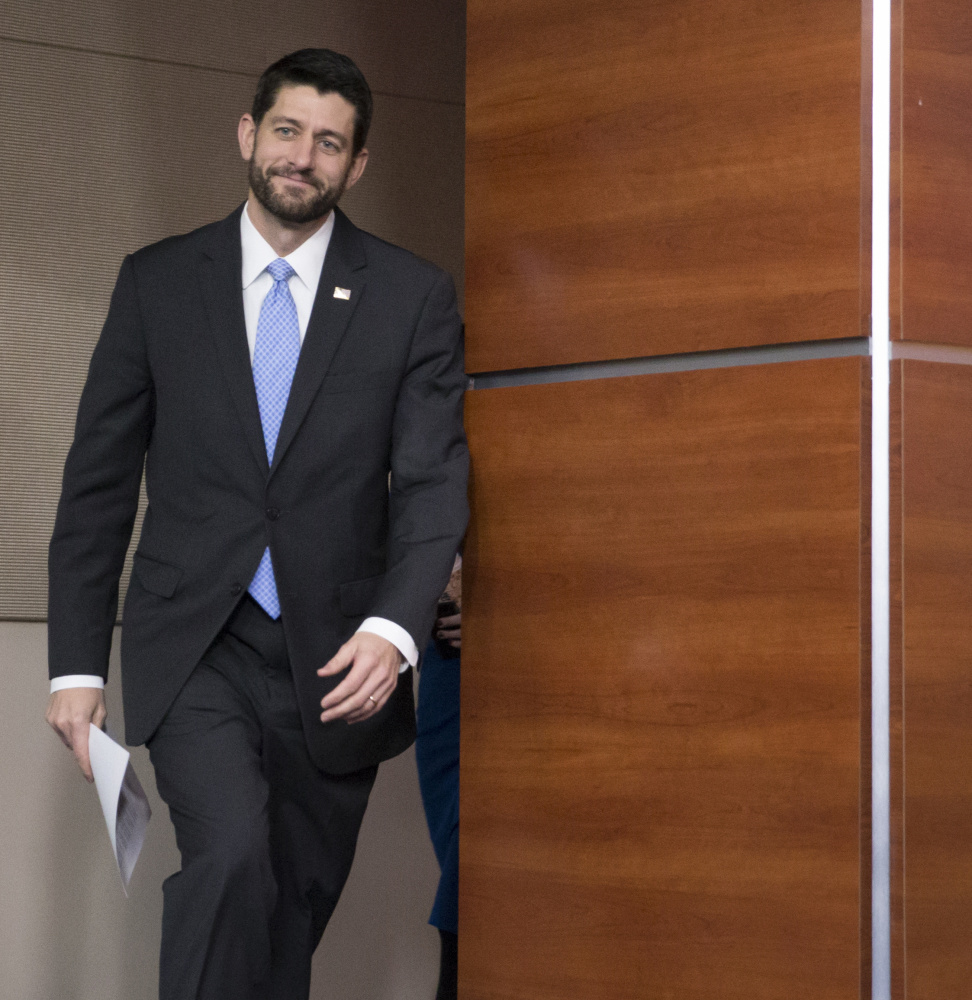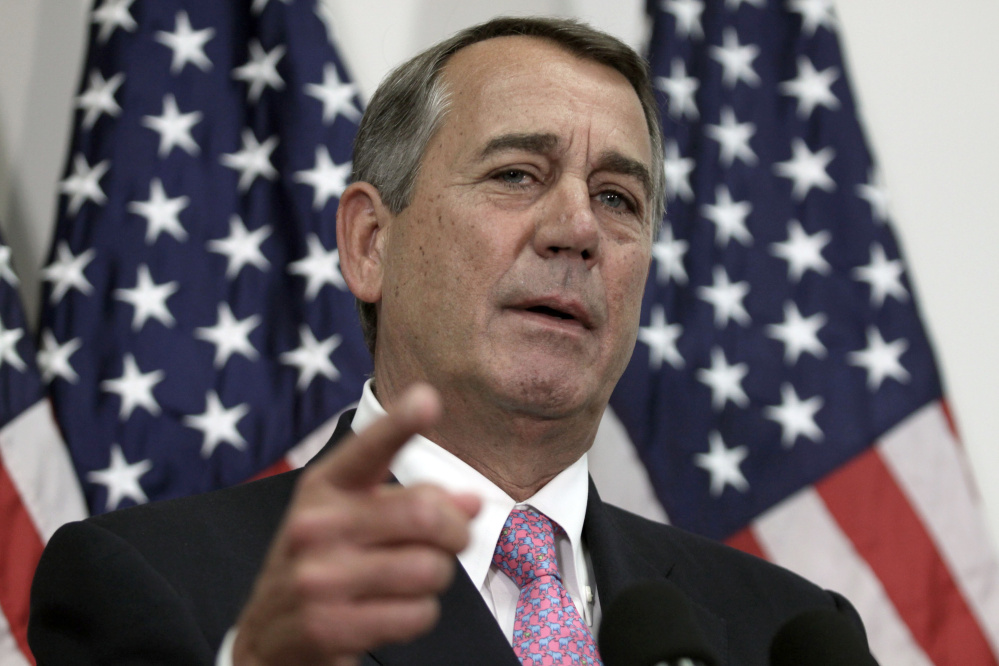WASHINGTON — The House is expected to pass a $1.1 trillion spending bill Friday that will remove any threat of a government shutdown, keep the government funded into the fall of 2016 and notch a signature win for new House Speaker Paul D. Ryan, R-Wisconsin.
The bill will pass despite the possibility that most Republicans will vote against it – just as they voted against fiscal deals negotiated by Ryan’s often-besieged predecessor, John A. Boehner, R-Ohio.
But there has been a distinct change in tone for House Republicans under Ryan. The negotiations over the spending bill, for example, took place in much the same way and produced similar results as they did under Boehner, but with almost none of the acrimony or divisiveness that had become the hallmark of Boehner’s tenure.
But as Boehner’s torment has morphed into Ryan’s triumph, one question facing Republicans is whether Ryan’s speakership will fundamentally change the way the party functions or the speaker is just enjoying a post-Boehner honeymoon.
“There are people who are willing to take a risk with him, willing to jump,” Rep. Adam Kinzinger, R-Illinois, said. “I like Boehner, obviously, but he had gotten toxic, and I think it became easier for people to say no to him.”
The conservatives who balked at Boehner’s top-down leadership style say Ryan has sent the right signals, even if the final product of the spending talks isn’t any more palatable to them than what Boehner might have negotiated. At its core, the deal that is expected to be approved this week is one essentially set in motion by Boehner.
While Republicans were able to extract an end to the 40-year-old ban on exports of U.S. crude oil, they failed to secure major curbs on White House policy initiatives, including labor, financial and environmental regulations. And they were unable to add restrictions on abortions.
IN THE OPEN
Conservatives credit Ryan with moving to open the appropriations process in the aftermath of the budget deal negotiated by Boehner in his final days, an accord that lifted spending caps that many Republicans wanted to maintain.
Pressed about why things are different under Ryan, rank-and-file lawmakers could not point to any specific changes made by the new speaker. His reforms to an internal group that doles out committee assignments were cosmetic, at best, and his early decision to have an open amendment process on a massive highway funding bill has been followed by mostly closed consideration of legislation that needs to pass quickly.
On the Boehner vs. Ryan question, Republicans tend to split into two camps; those who say they trust Ryan more than Boehner, and those who are giving him the early benefit of the doubt. The latter group has decided to rally around their new leader, saying that the real verdict on his leadership will come next year.
Ryan, 45, is part of the more conservative wing of the Republican conference, ideologically and generationally, in a way that Boehner, 65, never was. That has afforded him a level of trust and credibility among the rank and file, which has allowed him to be more upfront in setting expectations about what can and cannot be achieved.
Because so many conservatives did not trust him, Boehner was always in the position of trying to shore up support for the next leadership election. The result was that he was forced, at the beginning of each negotiation with Obama, to promise his troops that he would fight for their demands harder than ever before. This led Boehner into repeatedly over-promising and under-delivering.
Ryan’s deeper well of trust among the conservative wing has allowed him to be far more forthright in delivering bad news than Boehner usually was.
“He’s been getting up and saying, ‘That’s not going to happen, and you know that’ on several occasions, and it’s been productive,” said Rep. Darrell Issa, R-California.
Senate Minority Leader Harry M. Reid, D-Nevada, praised Ryan’s “hands-on” style, which he said differs from Boehner’s “staff-driven” approach to high-stakes negotiations.
TO SUSTAIN A GOOD START
Ryan said Wednesday he would like the Senate to consider and vote on House-passed legislation. “We want to make sure that we have a situation where the House passes an appropriation bill and the Senate actually considers an appropriation bill.”
Other Republicans are pleased to see Ryan’s honeymoon going well, but they warn that things could go south next year.
“Let’s help the new guy get off to a good start, some people would call that a honeymoon,” said Rep. John Kline, R-Minnesota, a close Boehner ally who attributed the goodwill to a general desire for a fresh start.
Ryan has also benefited from the perception that the spending deal is more a product of Boehner’s leadership than his own – a perception that Ryan has done nothing to counter.
“I think we played our cards the best we could, given the cards we were given, given the situation we inherited,” he said Wednesday.
Boehner launched the appropriations process earlier this year, bringing spending bills to the floor over the summer with high hopes of following “regular order” and passing the 12 bills individually ahead of the Sept. 30 close of the fiscal year. But in mid-summer, the addition of a spending rider dealing with the display of the Confederate battle flag on federal property stalled the process.
Meanwhile, Senate Democrats were vowing to filibuster any spending bill until Republicans agreed to negotiations on overall funding levels. Boehner finally came to the negotiating table in October, after announcing that he would soon resign.
The budget deal, which was supported by only 79 Republicans, set the overall funding levels for the next two years, but it was left to Ryan to complete the process of filling in the detailed budget lines for every federal agency for 2016.
Rep. John Fleming, R-Louisiana, a member of the conservative House Freedom Caucus, said Ryan “gets a pass” for negotiating a trillion-dollar spending bill that includes only a handful of conservative priorities.
“Much of this was determined before he even took over,” Fleming said. “The kind of things we needed to do to get leverage, that was taken away before he even had an opportunity.”
This week Ryan repeatedly said that next year would be different and that there would not be a massive year-end bill that funds the entire federal bureaucracy; instead, he vowed to pass all 12 appropriations bills separately – a feat no Congress has achieved since 1994.
How close he comes to fulfilling that pledge may be how Ryan is ultimately judged.
Copy the Story LinkSend questions/comments to the editors.




Success. Please wait for the page to reload. If the page does not reload within 5 seconds, please refresh the page.
Enter your email and password to access comments.
Hi, to comment on stories you must . This profile is in addition to your subscription and website login.
Already have a commenting profile? .
Invalid username/password.
Please check your email to confirm and complete your registration.
Only subscribers are eligible to post comments. Please subscribe or login first for digital access. Here’s why.
Use the form below to reset your password. When you've submitted your account email, we will send an email with a reset code.